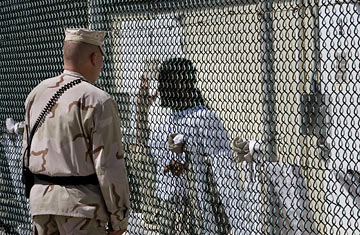
A Joint Task Force guard, left, talks with a detainee at Camp Delta in Guantánamo Bay Naval Station, Cuba
President Barack Obama's announcement on Tuesday that he is suspending repatriation of Yemeni detainees held by the U.S. at Guantánamo Bay solves one political problem but creates another. In the short term, it neutralizes the GOP talking point that Obama was putting the closure of the detention facility ahead of national security by sending Yemenis home. But it presents a longer-term challenge of how to win the battle to close the facility, which has been a key part of the GOP's strategy to undermine Obama from his earliest days in office.
Even before the Christmas bomb plot grabbed the political spotlight, the Administration was struggling with that dilemma. Senior national-security officials met in mid-December to figure out what to do with the 90-odd Yemeni prisoners who make up the largest contingent of the 200 or so remaining detainees at the offshore facility. A special task force set up a year ago concluded last fall that the U.S. doesn't have sufficient evidence to successfully prosecute any of the Yemenis in either civilian or military courts. Still, the task force concluded, about half of the prisoners are devoted members of al-Qaeda and therefore too dangerous to release.
The question facing Obama's top advisers in December was what to do with the 40 to 50 Yemeni detainees who were deemed by the task force to be safe for sending back to Yemen for eventual release under the right circumstances. The officials decided that circumstances militated against sending the men home. "We all took a look at Yemen and said, Man, this stinks," says a senior State Department official. "Normally when you repatriate [detainees] to a government that is competent, they keep an eye on them. In Yemen the government has less capacity [to do so]. We'd be negligent if we were ignoring that."
But holding on to all 90 of the Yemeni detainees presented a legal problem. Not only would it slow the closure of Gitmo, but the Justice Department concluded that six of the Yemenis under consideration were likely to win cases challenging their detention that they had brought in district court in Washington. Earlier last year, a Yemeni won his case and was repatriated and released. The Defense Department said it was comfortable releasing the six, as were the other departments, so in the end, Obama's national-security team sent them home. It is unclear whether they remain incarcerated in Yemen.
The decision to repatriate the Yemenis is complicated by their government's relatively rudimentary approach to rehabilitation. Essentially, it holds returnees for an indeterminate period of monitoring and then simply lets them go. In neighboring Saudi Arabia, by comparison, the government has set up a much-hailed rehabilitation program that U.S. officials say has an 85% success rate. Yemen has requested financial support from the U.S. to create a similar facility.
But the U.S. remains skeptical that the Yemenis would be as effective at running such a program as the Saudis, because Saudi Arabia's survival as a regime depends on suppressing its extremist threat. In Yemen, with little government ability to monitor released former Gitmo detainees in the hinterlands of the nation, a program could probably not guarantee the Saudi level of success. And even Saudi Arabia's 15% recidivism rate is problematic: the No. 2 leader of al-Qaeda in the Arabian Peninsula, the group that allegedly trained the Christmas Day bomber, is a graduate of the Saudi program.
